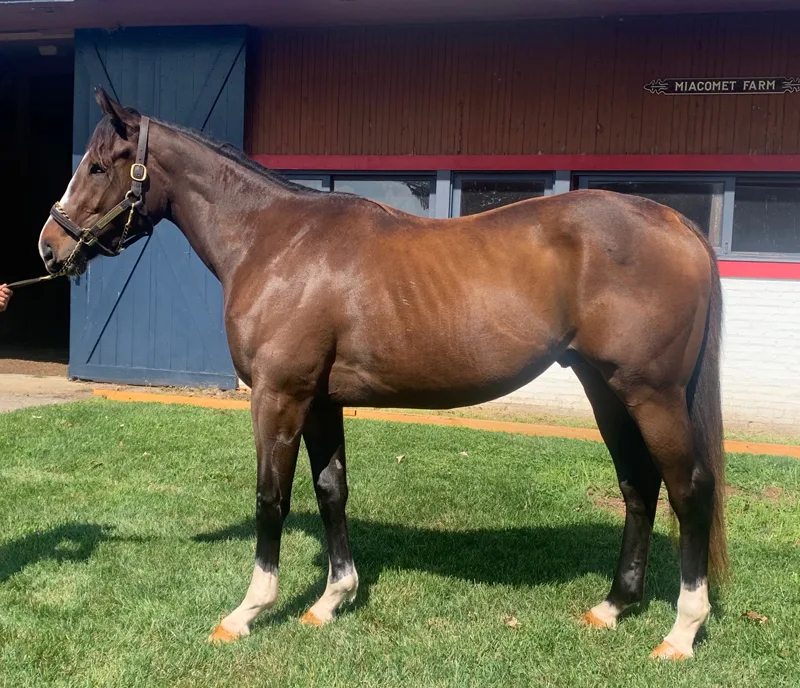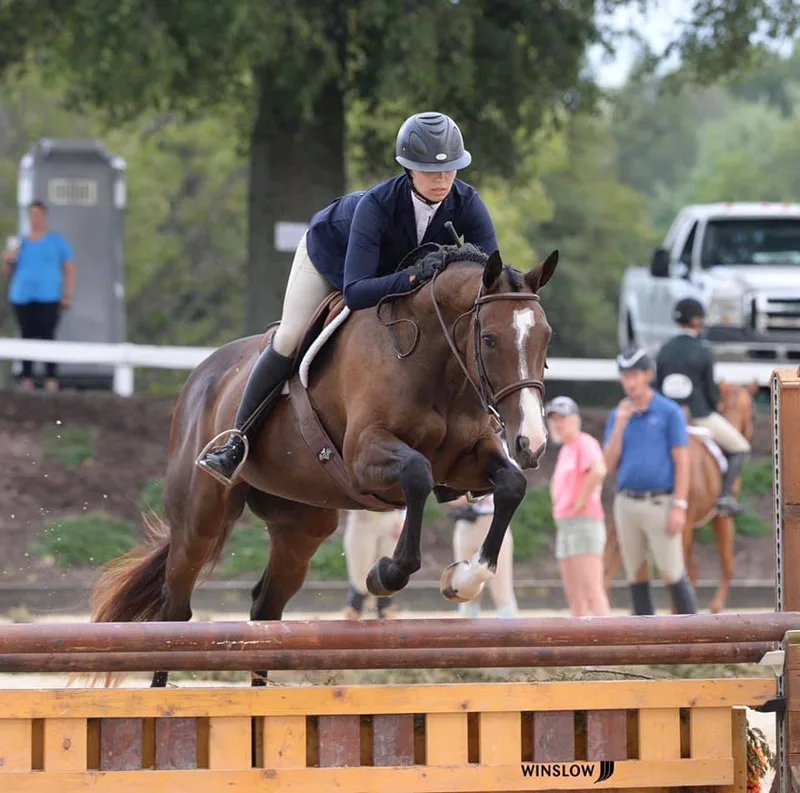A healthy bay colt with a wide, white blaze clambered up on wobbly legs in the early hours of Jan. 3, 2017, at Brookdale Farm in Versailles, Kentucky.
Like thousands of Thoroughbreds born each year, this one was bred with the hope that in time he might surge past a field of like-minded runners to earn fame and glory.
But this particular bundle of chrome-y legs carried the weight of far greater expectations than most. This foal, First Pharoah, was the firstborn of the first foal crop of Triple Crown winner American Pharoah.
First Pharoah’s arrival came with fanfare, including a mention in The New York Times. But in racing, bloodlines, exorbitant stud fees and sky-high auction prices mean little once a horse actually starts running.
While many of American Pharoah’s first foal crop have inherited their sire’s speed and desire to run—Four Wheel Drive (out of Funfair, who is by More Than Ready) ran three times in 2019 and won all his starts, earning $692,500 in his first year of racing—First Pharoah did not.

First Pharoah was so slow in training that his connections decided he would be better suited to a sport horse career, and he never raced. Photo Courtesy Of Oussama Aboughazale/Sumaya U.S. Stable
“After a few months of training on the track, he didn’t show much promise for speed, so his owners gelded him and sent him to Brooke Schafer and Tay Wienold to try a different career that suits him better!” came the announcement on Nov. 23 via the Facebook page of Pioneerof The Nile, sire of American Pharoah.
So how did amateur equestrians Schafer and Wienold get so lucky as to be tasked with re-starting one of the most famous failed racers alive? It started with a friendship forged in a Lexington, Kentucky, barn.
Schafer, 32, is a speech language pathologist who works full time in the Mercer County school system in Kentucky. She also does hospital work and paints custom glasses and ornaments in her “spare time.” But she grew up around Thoroughbreds and the racing industry. Her mother, Lindsay Hunter, had a lesson program that taught Schafer “safety first” and incorporated Thoroughbreds.
Wienold, 23, is an accountant at a bank, and she supplements her income with crafting. The pair met at the barn. Schafer had two horses, off-track Thoroughbred Kulik Lodge and an Arabian cross. Schafer asked Wienold for help with her Arabian, and later with “Kulik” as he rehabbed from an injury. They worked well together, so when the Arab sold, the women decided to use Schafer’s open stall at Bittersweet Acres to partner up on re-training off-track Thoroughbreds for sport.
They meet at the barn after work and stay late into the evening riding and training their personal horses and their projects. Wienold has been known to run to a show on her lunch break, do a class and then zip back to work.
ADVERTISEMENT
Hunter, who has been around thousands of Thoroughbreds off the track and broodmares, has been invaluable, picking up horses and helping out while Schafer and Wienold are at work.
The duo’s first official project was Wolf Rock (English Channel—On A Break, One Way Love), a Thoroughbred with 15 starts, and they might have been forgiven if they’d abandoned their burgeoning business after one horse. Despite finishing first four times, Wolf Rock turned out to have a previously undiscovered heart defect, and Schafer said they didn’t feel comfortable selling him. He’s now out to pasture as a companion horse.

With just a few months of training, First Pharoah’s dam, Kakadu, was winning ribbons in the hunters. Winslow Photography Photo
Then a friend recommended First Pharoah’s dam, Kakadu (Tizway—Alpha Spirit, A.P. Indy), as another project. The big mare had reproductive issues after foaling First Pharoah. Her owner, Oussama Aboughazale, who owns Sumaya U.S. Stable, spent the money on surgery to repair a cervical tear, despite knowing she couldn’t be bred again.
Hunter went to look at the mare for her daughter and came back with a resounding recommendation: “Take her. The mare is built like a brick house.”
A quick study, Kakadu understood longeing right away and did her first round of jumps within a month. She was showing over a hunter course just a few months later.
“It helps to work with a barn like Sumaya that takes the time in starting them right, letting them excel if they don’t succeed on the track,” said Wienold. “We text them progress and pictures, and they are thrilled to see them go on and shine in a new career.”
Kakadu finished in the ribbons in the special hunter division at the September New Vocations All-Thoroughbred Charity Horse Show (Kentucky), and soon after a local teenager bought her to event.
The partnership draws on Schafer’s experience with groundwork and Wienold’s background doing hunter/jumpers and equitation in the Chicago area. Wienold, who came to Lexington to go to the University of Kentucky, rode her own off-track Thoroughbred, Seven’s Prospect (Lucky Prospect—Pleasure To Dance, Sovereign Dancer), in the children’s jumpers.
They teach their project horses good basics so they can go in any direction, career-wise. Wienold said she “[tries] to climb on pretty quick to see what kind of brain they have.”
She’s found that as a general rule, off-track Thoroughbreds enjoy having a job. The horses spend plenty of time over crossrails, working four or five days a week and jumping a little bit at a time. Wienold and Schafer take the horses off the farm often and give them lots of exposure to new situations, schooling cross-country, tying to a trailer, trail riding and more.
ADVERTISEMENT
Aboughazale, who is originally from Jerusalem but now lives in Santiago, Chile, visited the farm, and impressed by their work with Kakadu, he offered Schafer and Wienold the opportunity to retrain two more horses: First Pharoah, and Kakadu’s half-sibling Lock Keeper (Quality Road—Alpha Spirit, A.P. Indy).

Lock Keeper didn’t have much interest in racing, so now he’s become a re-training project for Brooke Schafer and Tay Wienold. Photo Courtesy Of Oussama Aboughazale/Sumaya U.S. Stable
The 3-year-old Lock Keeper had raced twice and finished last both times, with no interest in running, according to Schafer. So “Lockie” went to Schafer and Wienold soon after the gelding’s last race on Sept. 28.
While Lockie is still growing into himself, he’s taken to his new career, learning to be steady in the bridle and jump small courses.
First Pharoah looks just like his mother, and he’s more like a warmblood than a Thoroughbred. Not yet 3, he’s already a solid 16.1.
Because he is big and young, they turned “FP” out to let him grow up. He was gelded in October.
Wienold said, “The mare [Kakakdu] was a stout mare and an easy keeper, and he’s that plus a lot. We’re waiting for his joints to close up. He’s a really big boy.
“He is such a nice horse and is such an opportunity for us,” she added.

Tay Wienold (left) and Brooke Schafer are looking forward to the opportunity to train First Pharoah for a sport horse career. Photo Courtesy Of T & B Sporthorses
Wienold said FP is a bit of a ham, running to the gate and saying, “You are my people. Can I get some love?”
“We are hopeful that he will excel in the sport horse world, but we’ll let him tell us the division,” said Schafer. “He will most likely be offered to the public once he has had a chance to learn the ropes of a new career, but we are in no hurry to give up ownership on such a grand horse.”
You can follow along with FP’s re-training journey on his Facebook page.














